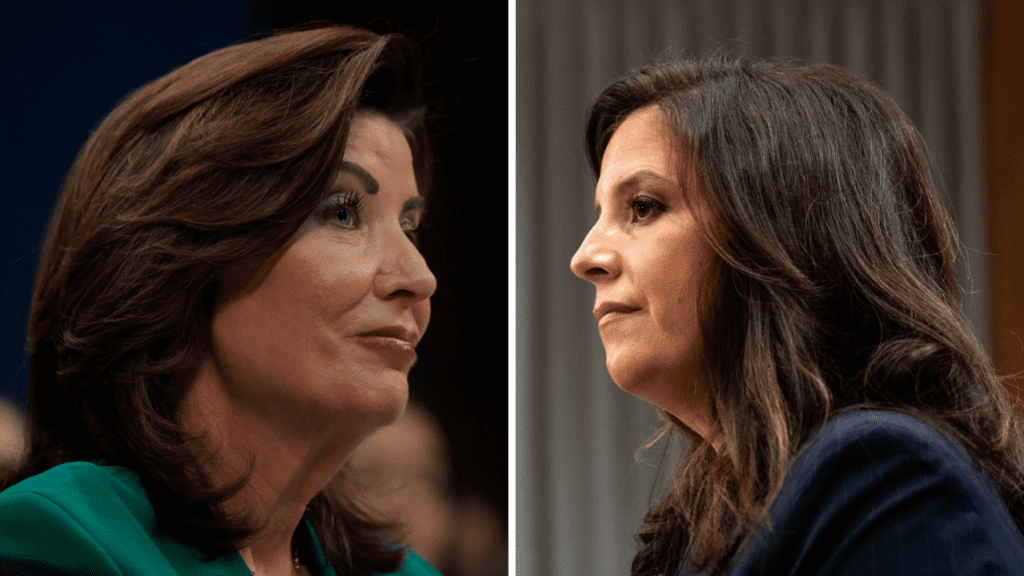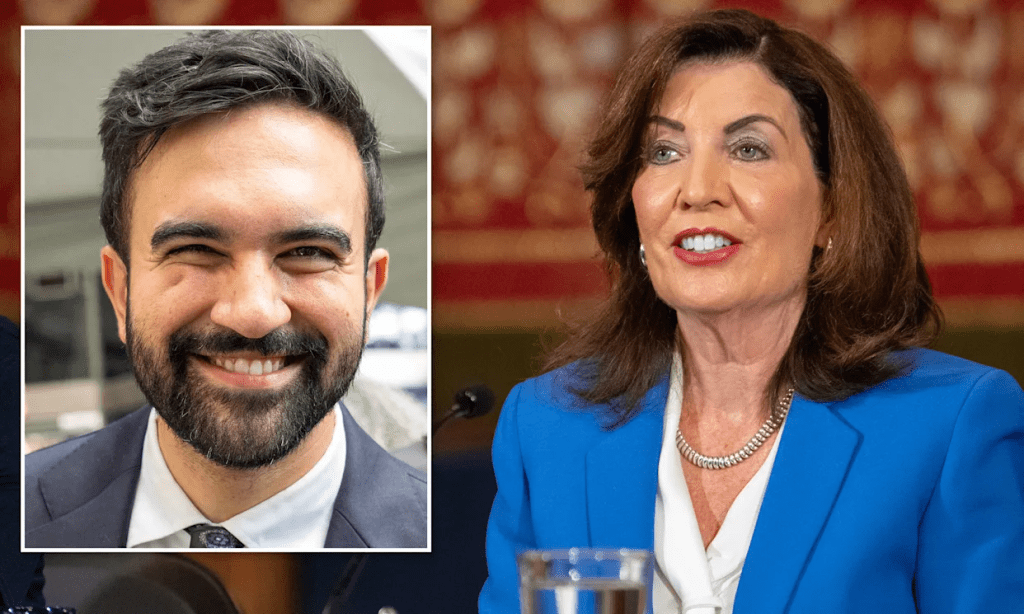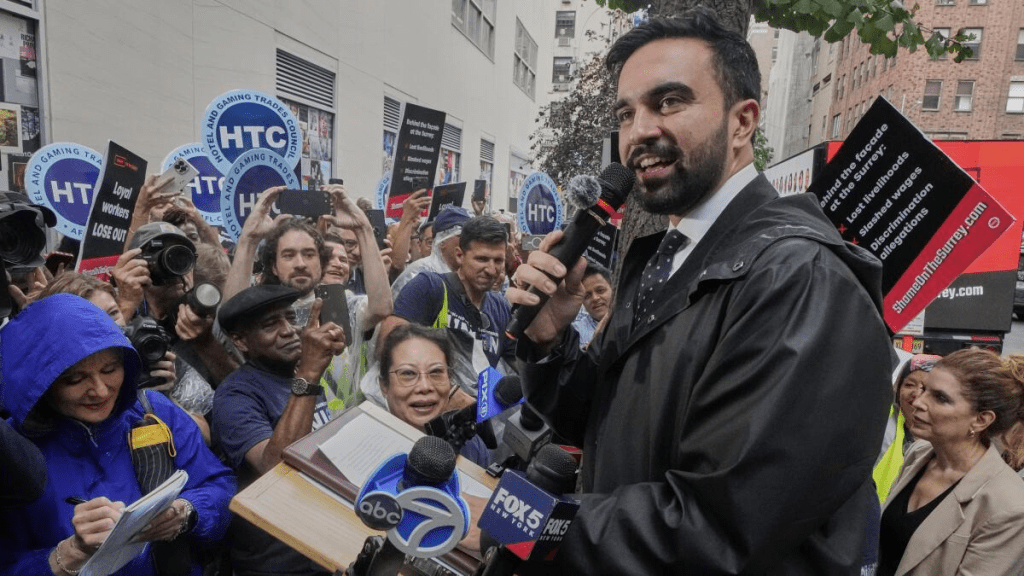Governor Kathy Hochul’s Endorsement of Zohran Mamdani Sparks Democratic Backlash as Rep. Elise Stefanik Declares Party Wants Her Gone: “The Worst Governor in America”
New York Governor Kathy Hochul is facing growing backlash from her own party after endorsing Assemblyman Zohran Mamdani for New York City mayor — a move that insiders say has ignited fury among moderates and shaken confidence in her political judgment. The endorsement, which aligns Hochul with one of the state’s most progressive and controversial figures, has been described as a serious miscalculation that could fracture Democratic unity ahead of an already volatile election cycle.
According to Rep. Elise Stefanik, who has emerged as one of Hochul’s sharpest critics, the fallout from her endorsement is spreading fast across New York’s Democratic circles. “Even Democrats are embarrassed,” Stefanik told reporters, calling Hochul “the worst governor in America.” She added that party members are “champing at the bit” to see the governor replaced, citing growing frustration among rank-and-file Democrats who view Hochul as politically tone-deaf and disconnected from voter concerns.

The controversy began after Hochul publicly endorsed Zohran Mamdani, a self-proclaimed socialist and member of the Democratic Socialists of America, who is running on a platform that includes sweeping rent control expansion, police budget cuts, and large-scale housing reform. While Mamdani’s platform has energized New York’s left-wing base, it has alarmed more moderate Democrats who fear such policies will alienate swing voters and embolden Republican attacks heading into the 2026 gubernatorial race.
Mamdani, who currently represents parts of Astoria, Queens, has gained national attention for his bold rhetoric and confrontational approach to politics. He has frequently clashed with party leadership, accusing both city and state Democrats of ignoring working-class New Yorkers in favor of corporate donors and real estate interests. “We can’t keep running New York for billionaires,” Mamdani declared at a recent rally. “The working class deserves power — not just promises.”
That defiance, while celebrated by his supporters, has made Mamdani one of the most polarizing figures in New York politics. Critics argue that his agenda is unrealistic, costly, and deeply out of step with mainstream Democrats, who are already struggling to retain moderate voters in key boroughs. Hochul’s decision to endorse him, then, has baffled even longtime allies. “This was a mistake that didn’t need to happen,” said one Democratic strategist close to the governor’s team. “She’s already dealing with low approval ratings and a fractured party — and now she’s thrown gasoline on the fire.”

Hochul’s endorsement has triggered immediate political fallout. In Albany, several senior Democrats privately voiced frustration, describing the move as “political suicide” and warning that it could cost her vital donor support. One state senator reportedly told colleagues that “people are fuming” and that internal discussions about a 2026 primary challenge are already underway. “She’s lost the room,” the senator said.
For Republicans, the controversy has been a gift. Stefanik, who has made a national name for herself as a rising GOP leader and prominent ally of former President Donald Trump, pounced on the opportunity to highlight what she called “radical extremism” within the Democratic Party. “Kathy Hochul has aligned herself with socialists who want to defund the police, crush small businesses, and destroy New York’s economy,” Stefanik said. “Even Democrats are done with her. She’s failed the state and she’s failed her own party.”
The backlash also comes at a time when Hochul is already under pressure over a string of policy setbacks and persistent criticism of her leadership. Since taking office after Andrew Cuomo’s resignation in 2021, Hochul has struggled to define her own identity as governor. Her tenure has been marked by clashes with New York City leaders, declining voter confidence, and deepening concerns over crime, affordability, and housing shortages. While she narrowly won her first full term in 2022, defeating Republican challenger Lee Zeldin by a far slimmer margin than expected, her support among moderates and independents has continued to erode.

Party insiders say this latest controversy may accelerate that decline. “Hochul is trying to appeal to everyone, and it’s not working,” said a senior Democratic consultant. “Endorsing Zohran Mamdani might play well in parts of Queens and Brooklyn, but it’s political poison upstate and among moderate donors.”
Zohran Mamdani’s rise has been rapid and polarizing. Born in Kampala, Uganda, and raised in New York City, he built his reputation as a community organizer before unseating a longtime Democratic incumbent in 2020. Since then, he has become a prominent voice for the party’s left flank, advocating for sweeping reforms in housing, policing, and healthcare. His campaign for mayor — built around slogans like “A City for the Many, Not the Millionaires” — has drawn strong enthusiasm from progressive voters, but equally strong skepticism from the establishment.
For Hochul, the decision to stand by Mamdani appears to be rooted in political calculation — an effort to shore up support from younger and more progressive voters who have often viewed her as too cautious. But that move may have backfired. “She’s trying to borrow credibility from a movement that doesn’t trust her,” said a political analyst from Fordham University. “Progressives will never see Hochul as one of them, and moderates will see this as proof that she’s lost control.”

Rep. Elise Stefanik’s comments have only added fuel to the fire. In her statement, Stefanik accused Hochul of “turning New York into a socialist experiment” and claimed that Democrats across the state are “begging for change.” She went on to say that Hochul’s endorsement of Mamdani shows “exactly why so many New Yorkers are fleeing the state.” The line, though hyperbolic, resonates with growing frustration among residents over rising taxes, declining public safety, and an exodus of middle-class families to other states.
The debate also touches a broader national theme: the identity crisis within the Democratic Party. Across the country, Democrats are struggling to reconcile the priorities of their progressive base with the realities of governing a deeply divided electorate. Hochul’s decision to side with Mamdani is being interpreted as part of that struggle — a symbol of how establishment Democrats are increasingly pressured to embrace far-left positions to avoid being labeled “out of touch.” But as one party operative noted, “Every time a Democrat tries to chase the far left, they lose the middle — and that’s where elections are won.”
Meanwhile, Hochul has attempted to play down the controversy. In a brief statement, her office said the governor “supports leaders who are fighting for equity, justice, and opportunity for all New Yorkers.” But the explanation has done little to calm the storm. Even some of Hochul’s defenders admit that the timing of the endorsement — coming amid concerns about economic stagnation and record outmigration — couldn’t have been worse. “She didn’t read the room,” one aide admitted privately. “People wanted reassurance and stability, not another ideological fight.”

The story continues to ripple through New York political circles. In Manhattan, major donors are reportedly reconsidering their commitments to Hochul’s re-election campaign, worried that her embrace of progressive candidates could alienate business interests. In upstate districts, Democratic lawmakers have begun distancing themselves from the governor, emphasizing their own centrist credentials in an effort to protect vulnerable seats. And in Queens, where Mamdani’s movement is strongest, activists have seized on Hochul’s endorsement as validation that the progressive wing has finally forced its way into the Democratic mainstream.
For Zohran Mamdani, the controversy may actually serve as political fuel. His campaign has seen a surge in online donations and volunteer signups since the story broke. “They can call me whatever they want,” he told supporters at a rally Friday night. “But I stand with working people, not the wealthy few. That’s what this movement is about.”
Still, the broader implications for Kathy Hochul remain grim. As Rep. Stefanik’s remarks echo across social media and cable news, the narrative of a governor under siege is taking hold. “She’s politically wounded,” said one Democratic pollster. “This endorsement didn’t just upset moderates — it confirmed their worst fears about where the party is headed.”

What happens next will likely shape the future of New York’s Democratic Party. If Hochul continues to embrace progressive figures like Mamdani, she risks deepening the divide within her ranks. But if she reverses course, she risks alienating the very voters she’s trying to court. It’s a political tightrope — one that even seasoned governors struggle to walk.
For now, Elise Stefanik’s words ring loudly in the state’s political landscape: “The worst governor in America.” Whether that label sticks remains to be seen, but one thing is clear — Kathy Hochul’s latest gamble has left her fighting for her political survival, caught between two sides of a party that no longer agrees on what it stands for.


